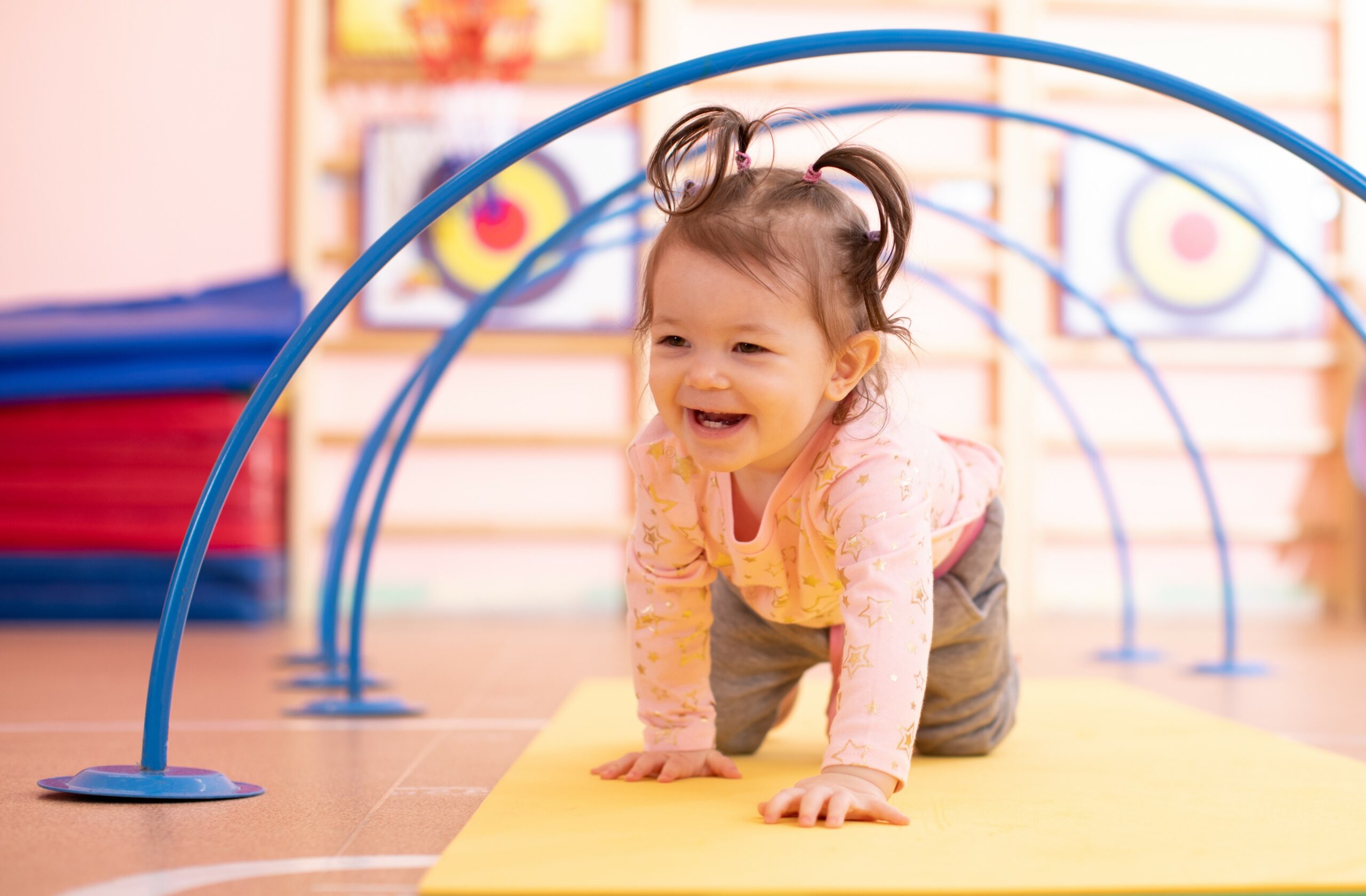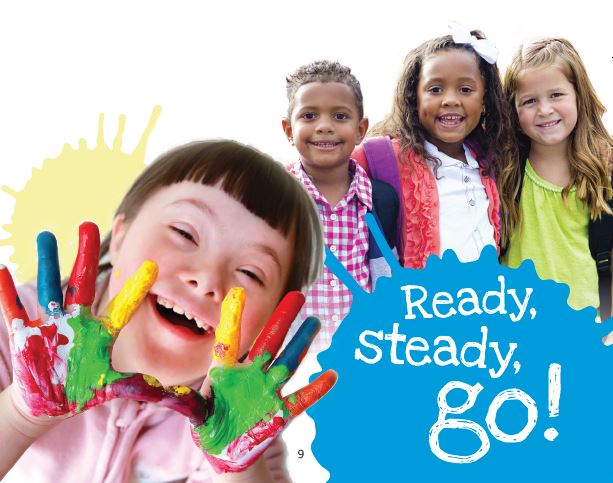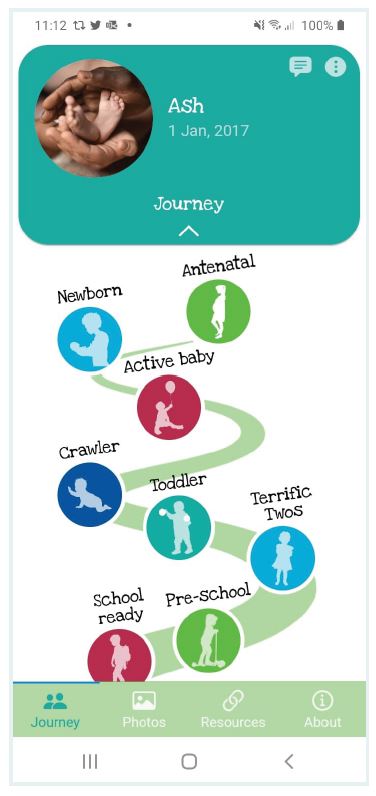Born to move
Last edited: 20/12/2022
Print this page
Share on social media
This content may not be reproduced, without the permission of Kent Community Health NHS Foundation Trust - contact us.
Help your children to be the best they can be with born to move...

Eyes need to move - this develops their eye muscles for reading later on.
Chatter matters - talk to your baby each day. This will help yur child learn to speak.
Playtime - Being active with lots of awake tummy time will support your baby's physical and brain development.
This leaflet gives advice for parents and carers on how to achieve this.
Chatter matters
Talk to your baby each day.
Every time you talk or sing to your baby, you’re helping their brain to grow.
When your baby is quiet and alert, try talking and waiting to see their response.
Babies learn to communicate through eye contact, facial expression and sounds before using words themselves.
Awake tummy time in babies
Placing babies on their tummies while awake helps to:
- strengthen your baby’s back and neck muscles in preparation for crawling
- develop the brain and strengthen links between the right and left sides – 60 per cent of brain development happens in the first year of life. Awake tummy time is important in this
- encourage your baby to learn to roll, which helps to develop balance and to learn how big they are in relation to their surroundings (spatial awareness)
- encourage crawling: Babies who spend time on their tummies are more likely to be crawling by eight-months-old
- prevent a condition called plagiocephaly – a flattening of one side of the skull, which can develop if babies spend too much time on their backs.
Activities for babies

To encourage awake tummy time, you could try:
- placing your baby on a bright rug. A rolled up blanket can be placed underneath their chest and armpits to make them comfortable
- crawling – These activities will help your baby learn to crawl. Crawling is vital in developing your baby’s motor system, but is also important in many other ways including helping many areas of brain development such as speech
- baby massage stimulates and develops nerve pathways and is great for relaxation too
- lying your baby on your chest
- lying your baby on your legs and gently lifting them up and down.
Make sure you always supervise your baby during tummy time and stop if your baby is getting tired.
Do not put babies to sleep on their tummies.
Movement in babies and children helps them to:
- develop intellectually, emotionally, socially and physically
- build the foundations for learning, moving and communicating
- develop a life-long interest in being active
- become a happy and confident child.
Eyes need to move too
Try blowing bubbles; they are a great way to encourage babies to track moving objects with their eyes. This will strengthen the muscles that control eye movements, which will help them when learning to read.
Tips to get your children’s eyes to move...
Eye muscles
Too much time spent in front of a TV can cause ocular lock, where eye muscles develop less well. To help your children to develop good control of their eye muscles, you must give their eyes some stimulation.
Play games
Play games with brightly coloured puppets and toys, which will help develop vision and is also great fun and a fantastic way to bond with your child.
Eye-to-eye contact
When you look into your baby’s eyes and they have your full attention, they are engaging all of their brain.
Read
When reading to your child, point slowly to different things on the page, encouraging your child’s eyes to move and focus on small details.
What about toddlers pre-school children?
Toddlers and young children love to be active.
It will improve their co-ordination, movement and balance, and it may just wear them out for bedtime.
Catching, throwing and kicking
- Why not try
- chasing bubbles
- playing with different types of balls or bean bags or balloons.
- To improve
- your child’s hand-to-eye co-ordination.
Hands and fingers
- Why not try
- climbing ladders or frames, when supervised
- playing with Play-doh
- baking and making things.
- To improve
- fine finger movements and strength, which will help when learning to write.
Swinging, spinning and rocking
- Why not try
- encouraging hanging upside down safely at the park. A child must be supervised at all times
- rolling down banks.
- To improve
- balance.
Running and jumping
- Why not try
- games of tag or stuck in the mud
- encouraging hopping and jumping.
- To improve
- balance and keep your child fit and healthy.
- They are also great fun and will help strengthen muscles.
Get your child ready for school…

Your child will feel more independent and confident when they start school. Why not try practising these things with your child in the run up to school.
- Going to the toilet and washing their hands by themselves.
- Dressing themselves; putting on coats, jumpers and shoes.
- Putting their toys away when they have finished playing.
- Playing with other children to make friends.
- Enjoying getting messy when playing.
- Sitting and talking about a book.
- Using a knife and fork.
- Holding a pencil.
Any worries, speak to your health visitor
Your local Health Visiting Team is here to support you and your child on your amazing journey from birth to school.
You will be offered regular health and development reviews for your baby until they are two. These are to support you and your baby and make sure their
development is on track.
This gives you both a chance to ask questions and talk about any concerns you have.
If you have any concerns or would like to speak to a health visitor, please see our website Kent Baby for details of your local team.
Download the app
 The Born to Move app gives you ways to play and interact with your child during their early years to support their learning and development. Find ways to stimulate your child and grow a strong bond with them encouraging their brain to grow as well as building a happy, healthy and confident child. Born to Move has been developed by Kent Health Visiting Team and features messages from your local team at key points to offer guidance along the way.
The Born to Move app gives you ways to play and interact with your child during their early years to support their learning and development. Find ways to stimulate your child and grow a strong bond with them encouraging their brain to grow as well as building a happy, healthy and confident child. Born to Move has been developed by Kent Health Visiting Team and features messages from your local team at key points to offer guidance along the way.
Free to download from the App Store and Google Play this handy little app has been developed by health visitors and parents to help your baby move and develop, every step of the way.
The amazing journey from pregnancy to your child starting school.
- Antenatal – Stroke and sing to your ump, they will love listening to you.
- Newborn – Talk to your baby with lots of smiles and eye contact.
- Active baby – put your baby on their tummy sometimes while awake to strengthen their muscles in preparation for crawling.
- Crawler – Point things out to your baby and talk about them.
- Toddler – Read books together.
- Terrific two’s – Get outside, jump in some puddles.
- Preschool – Play games that involve taking turns.
- School ready – Help your child play with other children of a similar age.
Every time you talk or sing to your baby, you are helping their brain grow.
We like to move it
Encouraging your children to be active from the beginning of life will improve all areas of development and prepare them for the challenges of school.
If you want your children to fulfil their potential and stay healthy, get them moving today.
Find out more at www.kentcht.nhs.uk/borntomove
Facebook @kentcommunityhealth
Twitter @NHSKentCHFT
Contact us
 We really want to hear from you if you need our help or are feeling worried about anything.
We really want to hear from you if you need our help or are feeling worried about anything.
Come along to a child health clinic for advice, information and support for you and your child's health and development from your local Health Visiting Team.
There are 12 Health Visiting Teams in Kent and you can ring your local team Monday to Friday, 9am to 5pm (excluding bank holidays) for support. When you call, we’ll listen, answer any questions and signpost you on to other support if necessary. We are here to support on a range of issues including:
- infant feeding
- development or behaviour concerns
- healthy eating
- you and your baby/child’s emotional well being
- immunisations
- toileting
- sleep
- accident prevention.
If you have medical concerns about your child or yourself please call 111, your GP or if urgent call 999.
You can email healthvisitingappointments@nhs.net to change or amend an appointment.
You can contact your local team for support using the details below.
Ashford − 0300 123 3092 / kentchft.ashfordHV@nhs.net
Canterbury and Coastal − 0300 7900 156 / kentchft.canterburyHV@nhs.net
Dartford − 0300 123 2075 / kentchft.dartfordHV@nhs.net
Dover − 0300 1233018 / kentchft.doverHV@nhs.net
Gravesend − 0300 123 2076 / kentchft.gravesendHV@nhs.net
Maidstone − 0300 555 0506 / kentchft.maidstoneHV@nhs.net
Sevenoaks, Swanley and Edenbridge − 0300 123 4497 / kentchft.sevenoaksHV@nhs.net
Shepway − 0300 123 1240 / kentchft.shepwayHV@nhs.net
Swale − 0300 123 4014 / kentchft.swaleHV@nhs.net
Thanet − 0300 013 4740 / kentchft.thanetHV@nhs.net
Tonbridge and Malling − 0300 1233017 / kentchft.tonbridgemallingHV@nhs.net
Tunbridge Wells − 0300 790 0243 / kentchft.tunbridgewellsHV@nhs.net
Some of our appointments are offered virtually via phone or video calls. You can find out more about these and how to access your appointment on our website.
This information should only be followed on the advice of a healthcare professional.
Do you have feedback about our health services?
0800 030 4550
Text 07899 903499
Monday to Friday, 8.30am to 4.30pm
kentchft.PALS@nhs.net
kentcht.nhs.uk/PALS
Patient Advice and Liaison Service (PALS)
Kent Community Health NHS Foundation Trust
Trinity House, 110-120 Upper Pemberton
Ashford
Kent
TN25 4AZ
![]()
Donate today, and help the NHS go above and beyond. Visit kentcht.nhs.uk/icare
If you need communication support or this information in another format, please ask a member of staff or contact us using the details above.


